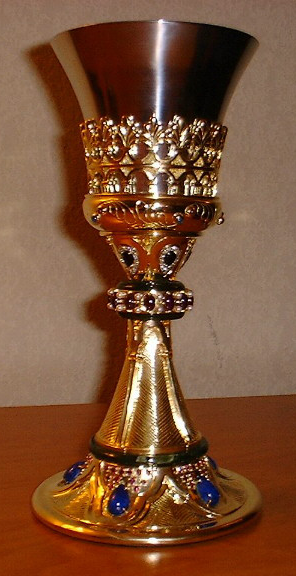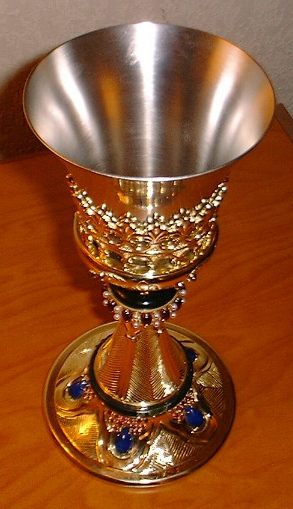

... Michael S. Rideout
By John Hardie
 In
late 1982, Atari set out to develop a sequel to their highly successful game,
Adventure. Originally dubbed Adventure II, this larger, more
encompassing RPG eventually evolved into a quartet of adventure games known
today as Swordquest. The four parts of the Swordquest series were titled
EarthWorld, FireWorld, WaterWorld, and AirWorld.
Each game had a contest and prize associated with it. The winners of each
contest were to receive the following prizes:
In
late 1982, Atari set out to develop a sequel to their highly successful game,
Adventure. Originally dubbed Adventure II, this larger, more
encompassing RPG eventually evolved into a quartet of adventure games known
today as Swordquest. The four parts of the Swordquest series were titled
EarthWorld, FireWorld, WaterWorld, and AirWorld.
Each game had a contest and prize associated with it. The winners of each
contest were to receive the following prizes:
EarthWorld - The Talisman: made of 18K solid gold, studded with 12
diamonds and the birthstones of the 12 zodiac signs.
FireWorld - The Chalice: made of platinum and gold, adorned with rubies,
sapphires, diamonds, pearls, citrines and green jade.
WaterWorld - The Crown: made of gold, encrusted with diamonds, rubies,
sapphires, green tourmalines, and aquamarines.
AirWorld - The Philosopher's Stone: a large piece of white jade, encased
in an 18K gold box featuring emeralds, rubies, diamonds, and citrines.

Each prize was valued at $25,000 and the winner of each contest would return to
compete for the grand prize; a jewel-encrusted Sword, with an 18K gold handle
and a silver blade, loaded with diamonds, emeralds, rubies, and sapphires, and
valued at $50,000.
As most of us know the contest was a bust and there has been much debate over
what exists and what doesn't, which prizes were awarded, etc. Here for the first
time, is an in-depth interview with Michael Rideout, the winner of the
Swordquest: FireWorld contest, who will give us a behind-the-scenes look at the
contest and possibly provide some answers to these questions.
|
BACKGROUND |
DP: Mike, can you start with some background info on yourself so our readers can get to know a little more about you?
Michael Rideout: Sure. I'm 39 years old. I'm not married. I'm a computer programmer for a company that writes software for real-estate companies. I enjoy reading fantasy and science-fiction, and watching videos, TV shows, and movies like Star Trek, Babylon 5, etc.
DP: Tell us how you got your start in videogames. What was your first game system?
Michael Rideout: My first game system was the Atari 2600. One day I was at a bar, and saw this guy playing a Missile Command coin-op, and it sort of captured my attention. I was just sitting there watching him play this game, like I was hypnotized. Shortly thereafter, our family got an Atari 2600 for Christmas and I just kinda went crazy with it. I got the Adventure game and Haunted House, and decided that those were the kind of games I liked the most.
DP: How old were you when you got your 2600?
Michael Rideout: It was probably around '81, so I would have been about 22 at the time.
DP: What other systems have you played with over the years?
Michael Rideout: Well, I got an Atari 8-bit computer that I played with for a while and did some programming on. I did get a Nintendo and bought some of the adventure-type games like Legend of Zelda.
DP: Have you seen any of the newer systems (Playstation, Jaguar, N64)?
Michael Rideout: I've seen commercials from time to time but I haven't really looked into them. I'm not really into gaming like I used to be. Every once in a while I'll buy a computer game, but I don't really play them to the extent that I used to. I liked the Ultima series although you really need to compile a lot of info, maps, and stuff, and they just get way too involved. A lot of the newer games seem to be very violent; shoot-em-up and fighting type games and I'm not really into that.
|
THE CONTEST |
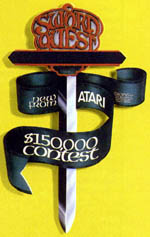 DP: Atari began
the Swordquest challenge with EarthWorld. Did you enter that
contest also?
DP: Atari began
the Swordquest challenge with EarthWorld. Did you enter that
contest also?
Michael Rideout: Yes. I bought EarthWorld and played it a lot. I didn't find very many clues, maybe three or four from playing the game. I found nine of the words in the comic book. As you know, while playing the game, clues came up on the screen that pointed to panels in the comic book. These panels contained words hidden in them. There were ten words hidden in the comic book and five of them were correct while the other five were dummies. It turns out the tenth word wasn't hidden the same way as the others were. Most of the panels had a word hidden in the picture, like written on a wall or in the grass, etc. Since I didn't find the number clue that pointed to the tenth word, I kept searching through the comic until I thought I saw the tenth word. I picked five words out of the ten I had found but only four out of the five were right so I didn't qualify for the contest, although I did receive a certificate.
DP: What about WaterWorld?
Michael Rideout: I bought the WaterWorld game through the Atari Club after the FireWorld contest. I played the game and found all the clues. They were a lot easier to find than in the other games. I found all the words in the comic, picked the four I thought were correct, and entered the contest. Apparently I didn't pick the correct four words so I didn't qualify.
DP: When you first started playing SwordQuest, was it your intention to try and win the contests? Or did you happen to think to yourself "Hey, this is easy. I should enter."?
Michael Rideout: I wanted to enter all of the contests and hopefully qualify for the finals so I could try for the prizes.
DP: How many finalists were there for FireWorld?
Michael Rideout: There was a maximum of 50 people who could be in the contest but a lot more than that qualified. I know that because they had to have a run-off. They sent everyone a piece of paper with some questions and we had to write in so many words or less, what we liked about the game. Out of those entries, the judges picked fifty contestants. I told them that I liked FireWorld better than EarthWorld and talked about the sound, graphics, and challenge of the game.
DP: Did you think you had any chance of being selected as one of the fifty finalists, let alone the winner?
Michael Rideout: I thought I had a pretty good chance of making the finals because I've always been good at writing. I was pretty honest in what I said. Some of the other people I met at the contest said they bullshitted about what a wonderful game it was even though they didn't really think that. I didn't have a lot of confidence in my ability to actually win the contest, because although I found the ten words in the comic book when I played the game at home, I had only found one number clue. I pretty much went to the game thinking "I'm going to lose this, so no problem." There wasn't a lot of pressure on me, which was good since I wasn't on the edge of my seat all tense while playing the game. I didn't feel I had as good a chance as some others who had found either all the clues, or more than I did.
DP: Can you briefly recall the order of events after submitting your essay that lead up to your arrival in California for the contest?

Michael Rideout: Atari sent me a letter stating that I had qualified as one of the fifty people. They sent me a travel itinerary and I flew to San Francisco. When I got there, I grabbed my luggage and was standing around waiting for the person who was supposed to meet me. As I was waiting I recognized Steven Bell, the EarthWorld winner, from his picture in the Atari Club magazine.
DP: Was Steven friendly to you at all or did you guys not really say much to each other?
Michael Rideout: I'd say it was pretty cordial. It wasn't really friendly at first.
DP: Did you feel intimidated at all? Did you say to yourself "Jeez, he's in this one too!"?
Michael Rideout: I guess a little bit. I had pretty much given up on my chances of winning anyway. I just thought it was nice to meet him. He had made friends with some of the people in the EarthWorld contest and they were more close-knit as a group; I'm a bit of a loner anyway.
DP: What happened after that?
Michael Rideout: A few other contestants arrived and the people from Atari came and drove us to our hotel. People were arriving throughout the day. The first day, we had the afternoon to ourselves and I walked down to Fisherman's Wharf and wandered around before the evening banquet.
DP: How many days were you there?
Michael Rideout: I believe it was three days total. We all arrived the first day and the next morning was the contest. After the contest they took us to lunch and we had a whirlwind tour of San Francisco and Alcatraz. The last day, we all got up and went to the airport to leave.
DP: Did Atari ever offer to show you around their headquarters at all or give you any kind of behind-the-scenes tour?
Michael Rideout: No. They never offered and we never got to see any of the buildings where they worked. They had us in a Holiday Inn downtown by Fisherman's Wharf.
DP: Is that where the actual contest was held?
Michael Rideout: Yes, at the hotel.
 DP: Did you
bring your 2600 system along so that you could practice before the event?
DP: Did you
bring your 2600 system along so that you could practice before the event?
Michael Rideout: Honestly, I didn't even think of that. They had told us that we couldn't use our own joysticks during the contest and I guess I figured that I wouldn't be able to hook it up to the hotel TV anyway.
DP: O.k. The day of the final competition arrives and I imagine you were a little bit nervous. What were you feeling? What was going through your head?
Michael Rideout: Well, I was excited to be in the contest. I wasn't too worked up about it, I was just enjoying the experience.
DP: Were the other contestants friendly to you? Did you share strategies or tips with each other?
Michael Rideout: There were a lot of different personalities present. Some people were timid and others were more friendly. A lot of people were talking about the different clues they had found at home. They asked me "How many did you find?" and I said "Well, I found one." I was sort of embarrassed to admit that. Some of the contestants had found one or two clues and others had found all ten. Everyone had been able to pick the words out of the comic whether or not they had actually found the clues in the game.
DP: What was different about the specially-programmed version of FireWorld compared to the retail version?
Michael Rideout: I think the contest version was actually easier. One thing about the home version was that you had to have four different objects in one room and another object in another room in order to trigger a clue. In the contest version, you had to have four objects in a room but you didn't have to have another object in some other room. They had a list of ten riddles, kind of like a clue sheet, to help point you in the right direction.
DP: Did they let you keep any of this stuff? Riddle sheets, custom version of the game?
Michael Rideout: They took back the riddle sheets. Some of the contestants were asking about keeping the custom version of the game but they said they needed them back. I think the reason for this was because the competition for the grand prize would require each of us to play all four games. So they probably planned on re-using the games.
DP: How long did it take you to finish this special version of the game? Was anyone close to catching you?
Michael Rideout: I think they told me afterwards that it took me like 45 minutes and I remember asking if anyone was doing as well as me. The guy supervising me said there was another person that was close.
DP: Were there any strategies that you used to help get you through the game?
Michael Rideout: Well, I started out using the riddle sheet and looked over a few of the riddles. You have to realize that I didn't expect to win anyway so I decided to ignore the riddle sheet, which I couldn't make heads or tails of anyway, and play like I did at home where I would just wander around collecting objects, and putting them into each room systematically. I put the riddle sheet down and started playing the game the way I always did and as I was collecting the different objects and moving through the various rooms, I got a clue. I wrote down all the information like where I was and what objects I had and continued on until I had about three or four clues this way. While playing at home, I had made some maps and figured out that the layout was based on the Tree of Life, which is in the Jewish Cabala. I knew about the Tree of Life because I had dabbled in Tarot cards when I was in high school and one of the Tarot spreads is based on the Tree of Life. The Tree of Life is comprised of ten circles arranged n three triangles and in the FireWorld game, each room was one of the points of the triangles and the tenth room was at the base of the tree.
DP: So, your knowledge of the design of the Tree of Life helped out a bit. How did things progress from this point on?
Michael Rideout: At the contest, I was numbering the rooms in the same order I had used at home. I was finding the clues and writing down where I was and I noticed there was a pattern, as far as which room had which clue. I figured if this pattern held, I would find clue #1 in a particular room, so I moved everything into that room, but I actually found the last clue instead. After thinking about it for a minute, I realized that maybe the first and last clues were swapped and everything else was the same. I looked at the different riddles on the clue sheet and it seemed to me that the rooms they were talking about did fit this pattern I had detected. So I went to the room where I thought the last clue would be and got the first clue. From that point on, I just started finding all the different clues in order very quickly. After about the first six or seven clues, I started to get a little more excited. Every time I would find a new clue, my heart would beat a little bit faster. When I finally did find the last clue, I was about to fall over.
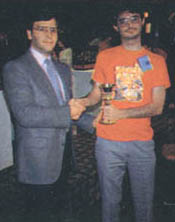
DP: What were you feeling when you realized you had won? Shock? Disbelief?
Michael Rideout: It was a shock! It seemed like it was unreal. I kept thinking "O.k. I'm going to wake up any minute and I'll be in bed in the hotel waiting for the contest to begin." So I was totally out of it. When they handed me the chalice to hold so they could take my picture, they practically had to hold me up because I was literally about to fall over. My legs were rubbery and I jokingly said "Gosh, I feel like I'm going to have a heart attack or something." They were like "Do you want us to call an ambulance?"
DP: What were the reactions from the other people at the contest?
Michael Rideout: Some of them were happy for me. I'm sure all of them were disappointed that they didn't win. I can imagine how they would have felt because I didn't expect to win either. I think some of the people who had been doing well were especially disappointed because they were almost there. When some of the other players found out that I had just played the game and not really used the riddles, they seemed to think it wasn't fair, like maybe the riddles had actually prevented them from winning. The reason I did choose that way to play was because I had no expectations of winning. I thought I had no chance at all of winning so I figured "Why not just play the game the way I always do?"
|
THE PRIZES |
DP: You were crowned the FireWorld champion and awarded the chalice. The first thing I'm sure everyone will want to know is.... Do you still have the chalice?
Michael Rideout: Yes. I have it in a bank vault. I've considered selling it from time to time although I'm more inclined to keep it as a family heirloom due to it's sentimental value. I consider it like a little nest egg where if push comes to shove, I can always sell the chalice.
DP: Can you describe the chalice for us? What is its composition, etc?
Michael Rideout: It's around seven to eight inches tall. The cup part of it is platinum and is maybe three or four inches across the top. The base is made of gold and has little diamonds on it. It also has three jade rings, two around the middle and one around the base. It has rubies and pearls going around the middle of it. There are five sapphires and some citrines in the middle section, as well as five lapis lazuli stones near the base.
DP: Mike, is there anything on the chalice that would associate it with this contest? Perhaps the Atari ("Fuji") symbol, the word Swordquest, or any other markings?
Michael Rideout: Nothing like that. It has no markings on it at all. It doesn't even say "made by Franklin Mint" or anything.
DP: The prizes for Swordquest were manufactured by the Franklin Mint, who are known to sell items that many would call "overpriced". The individual game prizes were valued at $25,000 and the grand prize at $50,000. Now, I'm not trying to belittle your prize in any way, but I have to ask... Do you think the chalice is actually worth $25,000?
Michael Rideout: At the moment, definitely not. When I received the chalice, I also got a sheet for taxation purposes that stated its value at around $21,600 or $22,600. Something like that, I forget exactly which it was. That was the value I had to put down on my income taxes.

DP: Do you think it's possible that Atari or the Franklin Mint inflated the value of the prize at all?
Michael Rideout: Supposedly, the value is based on the ingredients alone. As far as the diamonds go, they look very small to me so I wouldn't think that they were worth all that much, although I think there's like 65 of them. I would think that even if the price of gold went down a lot, that the Chalice would retain its value as an object of art, based on its workmanship. But as far as the actual meltdown value, I know it's not worth $25,000. In fact, I don't think it was worth $25,000 ten days after they made it because the price of gold was dropping.
DP: Have you ever had the chalice appraised?
Michael Rideout: No. I've had people urge me to do so but I haven't since I'm not really ready to part with it. I'm sure that jewelers, for the most part, are honest people, but I've heard a couple of stories of people who have taken things to a jeweler to have them appraised and when they got it back some of the stones had been replaced. Maybe I'm being paranoid...
DP: Did Atari award you the chalice on the spot or was it sent to you?
Michael Rideout: After the first contest, EarthWorld, they gave the Talisman to Steven Bell and let him take it home on the airplane. During the FireWorld contest, they explained that they figured that wasn't such a good idea. So what they did was to award me the prize and let me hold it for pictures and everything and then the security people took it back to the bank vault. They had Brinks deliver it to the bank where my brother worked in Atlanta and he signed for it and they put it in the vault there. My brother took it home and we all went to his house where I picked it up.
DP: What other prizes or promotional items were given out to yourself and the other participants?
Michael Rideout: We all got FireWorld t-shirts. We were allowed the opportunity to order the WaterWorld game at the contest where we also learned that it would only be sold through the Atari Club.
DP: As far as
the prizes go, we know that Atari awarded the Talisman and the Chalice. Do you
know if the other prizes exist or were they made to order as Atari needed them?
the other prizes exist or were they made to order as Atari needed them?
Michael Rideout: They did exist. All of the prizes were on display and well-guarded at the FireWorld contest. The Philosopher's Stone really took my breath away. All of the pictures showed it with the cover on but they had the cover off at the contest and the actual stone was this large chunk of white jade.
DP: Before the collectors out there start scouring the earth looking for the other prizes, let me ask you if you know what happened to them?
Michael Rideout: To be honest, I don't know. I kind of suspect that after the contest was called off, Atari either sold them or had them melted down.
DP: So you know Steven Bell, winner of the EarthWorld contest. Do you keep in touch with him at all?
Michael Rideout: I only knew him from the FireWorld contest. After the contest we exchanged photos of ourselves with our prizes, but that was it. That was the only contact I ever really had with him.
DP: Are you aware if he still owns the Talisman?
Michael Rideout: My understanding was that he had the Talisman melted down and sold to a coin dealer or something. He did keep part of it. There was a little sword on the Talisman that he kept but the rest was melted down and he used the money for other things like school. I remember going out with him and some others after the FireWorld contest and I think he said he got something like $15,000 for it. Remember that he kept the sword, which was made of white gold, and also that gold was dropping in price at that time.
DP: So do you think it's possible that the Chalice is the only surviving piece from the Swordquest Challenge?
Michael Rideout: I don't know because I don't really know what happened to the other pieces. I would certainly hope that they were left intact. I would imagine their value as art pieces would be worth more than if they were melted down and the pieces sold.
|
THE CHALLENGE CONTINUES? |
 DP: Atari
cancelled the contest as WaterWorld saw a limited release
through the club. Do you know if there were any finals or was a prize ever
awarded for WaterWorld?
DP: Atari
cancelled the contest as WaterWorld saw a limited release
through the club. Do you know if there were any finals or was a prize ever
awarded for WaterWorld?
Michael Rideout: They chose the finalists although if I remember correctly, they reduced the number to 15 instead of 50. This caused a lot of people to get upset. This was right at the time Atari was sold and everything went into limbo. I don't think the crown was ever awarded.
DP: Steven and yourself, and two future winners were supposed to compete for the grand prize, a $50,000 sword. How did Atari get out of the contest? Was there any legal obligation to you or Steven, or for them to finish the contest?
Michael Rideout: When I was in the FireWorld contest, there was a group of people that had been in EarthWorld, that said to me "Now, if Atari ever comes to you, make sure you don't agree to anything about canceling the contest." I guess they had a suspicion that Atari might try to do that. After a while, I got a letter from Atari stating that they wanted to cancel the contest. They offered Steven and myself $15,000 each to agree and they offered a smaller amount, maybe like $2,000 to each of the finalists for WaterWorld. I think the reason Steven and I got more than everyone else was because as winners of the first two contests, we had a definite chance of winning the Sword. Everyone involved had to agree or else the contest would continue. I tried to call Steven and some of the other people from the contest to see what they were going to do but I couldn't get in touch with anyone. I talked it over with my father and decided to accept the offer, figuring that someone else would decline.
DP: So you figured the money was a safe bet compared to getting nothing if you didn't win the grand prize?
Michael Rideout: That was a consideration. I figured if the contest would continue, I would love to play AirWorld and have a chance to get the Philosopher's Stone. In fact, I think I would have enjoyed having the Philosopher's Stone more than the Sword. The money was a sure bet. If we continued the contest, it was no sure thing that I would qualify for the fourth game; I already didn't qualify for the third game. If I did compete in the grand prize contest, there's nothing to say I'd win that either.
DP: Did Atari ever offer you anything else for your troubles?
Michael Rideout: When they gave us our checks as a consolation prize for canceling the contest, they also sent us an Atari 7800 and we got our choice of games to go with it.
DP: Do you personally have any knowledge as to why Atari pulled the plug on the contest? Was any reason ever given to you?
Michael Rideout: I don't recall them stating a reason in the letter. I think it was because at that time the 2600 was losing it's market niche. I don't think the games Atari was producing for the 2600 were selling as well as expected. A lot of people were coming to expect something close to a coin-op from the games and were getting disappointed. I think they were being unrealistic to expect that something similar to the coin-op could be produced on the 2600. Also it seemed everybody and their dog was making games for the 2600 and that was cutting into Atari's market. Also the fact that Atari was sold during this time may have had something to do with it.
DP: Have you ever seen any signs of AirWorld, the fourth game in the series?
Michael Rideout: No, I sure haven't.
DP: So there were no pre-release demos, prototypes or comics shown at the FireWorld finals?
Michael Rideout: No. Not that I'm aware of.
|
THE JOURNEY ENDS |
DP: Once you returned home, what were the reactions to your triumph from the people in your community?
Michael Rideout: When I was in San Francisco, after the contest, I went back to the hotel room and called my parents and my mother answered. She asked "How did it go?" I didn't want to break the news to her right away so I sort of hemmed and hawed and told her about pictures I had taken and finally she said "How'd you do?" I told her that I didn't come in last and she asked "Who did win?" I said "Oh, somebody from Aiken, South Carolina." She got really excited, laughing and crying that she almost couldn't talk. My parents met me at the airport and had a bunch of friends waiting at my house for a sort of welcome home party.
 DP: Would you
say there was any degree of fame that came with your accomplishment?
DP: Would you
say there was any degree of fame that came with your accomplishment?
Michael Rideout: Maybe a little brief period. Not so much fame but extra attention. My father was on a business trip and was talking to another man on the plane. He introduced himself as Mr. Rideout and said he was from Aiken, SC. and the man said "Do you have a son who won the Atari FireWorld contest?" Apparently he saw something in USA Today. I never really let it go to my head though. There were a couple of months when I couldn't stop talking about it and everybody got sick of it finally. They were like "Oh, shut up already."
DP: What about newspaper articles, magazines, or anything like that?
Michael Rideout: The local newspaper did one little story and took my picture before I got the Chalice. After I got the Chalice, they came and took another picture. Channel 10 in Columbia, SC. heard about it and wanted to do a spot on the evening news. They sent a TV crew down and briefly interviewed me and took pictures of me playing the game. I never got a copy of it unfortunately.
DP: Did you notice any jealousy or envy towards you from other people?
Michael Rideout: Not really. I don't know if there was or wasn't but there wasn't anything I noticed. Most of my friends and people I was associated with were proud of me.
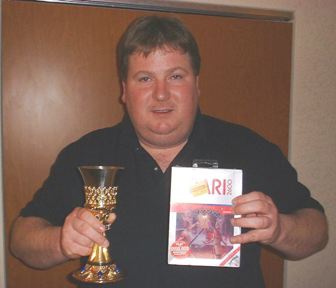
DP: Did you ever have a problem with people trying to get you to invest or donate your winnings? Charities, lawyers, con artists, swindlers, etc.?
Michael Rideout: No, people never really bothered me. Although at the contest, two of the contestants were a husband and wife and he was a minister of a church or something. After I won, they were like "What are you going to do with it?" and I said "Gosh, I don't know. I guess I'll put it in a bank or something." Then they suggested that I give it to the church although it didn't really dawn on me that they might have wanted me to give it to them. I told them if I did that, the church would want me to donate it and not pay me anything for it but I think that was their whole point.
DP: How did your parents feel about videogames before and then after you won the contest?
Michael Rideout: Before, they thought I was spending way too much time on them. I would take all my money and spend it on new games. I had thousands of dollars worth of videogames that I bought. I'd get them and be up all night long playing with them and it was cutting into my study time at college. I was like a videogame zombie. They didn't like that at all. But when I got into the contest they were excited for me. Then after I won, my father said something to the effect of "Well, I'll never complain to you again about playing videogames." Unfortunately, he didn't quite stick to that. For a while he did but when I got a Nintendo and was playing one of the adventure games for hours on end, he made some comment to the effect of "Gee, isn't there something you'd rather do than sit there and play games."
DP: Did you ever enter any other Atari contests?
Michael Rideout: No, I sure didn't. The only contests I ever entered were EarthWorld, FireWorld, and WaterWorld.
DP: Any final words you might have? Thoughts, comments, or stories you might want to add?
Michael Rideout: No, that pretty much covers it.
DP: Mike, I'd like to thank you for your time and for giving everyone a peek into Atari videogame history.
Michael Rideout: You're welcome, John.
Epilogue: Shortly after this interview, my research
turned up a few more facts. I could never see the reasoning behind having the
Franklin Mint design the prizes. I made a couple of calls to them and discovered
that they were owned by Warner Communications at the time. There was the link. I
spoke with someone in the Public Relations department who checked to see if any
records were kept as to the current whereabouts of the prizes. Unfortunately,
they had no records at all on the matter. The gentleman who designed the prizes
was still with the company but was not available for comment.
Recently, it was brought to my attention by a friend, that the remaining prizes
in the contest are now in the possession of Jack Tramiel, who as we all know,
bought Atari from Warner Communications. Whether he cancelled the contest as
part of cost-cutting measures he was implementing at the time or he just took a
liking to the prizes remains to be seen...
|
ADDENDUM |
The following is reprinted from a Usenet post by Michael Rideout right after the interview was done:
Steven Bell won the EarthWorld contest and was awarded the Medallion. I was told that he took it to a coin dealer and had it melted down. He got about $15,000 for it, which was about $10,000 less than its stated value of $25,000. But the price of gold had dropped, and the EarthWorld Medallion was almost all gold (except for the gemstones for the twelve signs of the zodiac, which couldn't have been worth very much). Also, Steven kept the miniature sword, which was on the face of the Medallion, so the money he got for it didn't include the value of the sword. I won the FireWorld contest and was awarded the Chalice. When they took my picture, I felt like I'd run an endurance race, and I could barely stand up, which is why I look like I'm about to keel over in the picture they took. I still have the "cheesy FireWorld t-shirt" in my closet, and the Chalice is in a safety deposit box in a bank vault. I was told that its value when I won it was over $21,000 or $22,000 (I forget the exact figure). I was more fortunate than Steven, because half of the value of the Chalice is in the platinum cup and the gemstones, which decorate the gold base, so even though the price of gold had dropped, the Chalice didn't depreciate as much as the Medallion had. The WaterWorld game was manufactured, but it was sold exclusively through the Atari Club. However, Warner Communications bought Atari before the WaterWorld contest was held, and apparently Warner decided to discontinue the Swordquest contests. The WaterWorld contest was never held. When Atari discontinued the contests, Steven and I each received compensatory checks for $15,000, and the 15(?) WaterWorld qualifiers each received compensatory checks for $2,000(?). I'm not positive about the number of WaterWorld qualifiers, but I believe it was 15 (see the next paragraph). I'm also not sure if the $2,000 figure is correct; it may have been $3,000 or even $5,000. All of my notes and documents related to Swordquest are stashed in a box somewhere, and it was over ten years ago, so my memory is a bit hazy. Some of the Swordquest participants were upset about changes in the contest rules. I think the original plan was to allow 50 people in each of the four contests; the winners of the four contests would then compete for the Sword in a final contest, which I think was going to consist of playing all four contest versions of the games, one after the other. I don't know how many people were in the EarthWorld contest (which I didn't qualify for), but I think it was less than 50. Over 50 people qualified for the FireWorld contest, so they used a tiebreaker to narrow it down to 50. (We had to write a paragraph saying what we liked about the game, and 50 people were picked on the basis of the answers.) When the WaterWorld game was sold through the Atari Club, Atari reduced the number of potential contestants to 15, or something like that, which upset some people. I only just remembered this, so it isn't mentioned in the interview I had with John Hardie. The Swordquest contests were indeed a "fiasco" for Atari, in my opinion. I think they'd hoped the contests would generate excitement and boost their sales. The contests did generate excitement, but the effect on their sales may have been less than anticipated. However, I don't know anyone who worked at Atari, so that's speculation on my part. I didn't qualify for WaterWorld (and I don't think Steven did, either), and the Crown didn't appeal to me that much anyway, but I thought the Philosopher's Stone was gorgeous, and I would have loved to have won it in the AirWorld contest. I don't know what became of the Crown, Philosopher's Stone, or Sword, but I'd guess that they were either sold or melted down by Atari to help recoup financial losses, with part of the money being paid to Steven, myself, and the WaterWorld qualifiers. However, that's also speculation on my part. John Hardie may have found out whatever became of those prizes. As for the games themselves, each game was easier than the ones preceding it, with EarthWorld being the hardest, and WaterWorld the easiest. The number of rooms in each game was fewer than the games before it; EarthWorld had 12 rooms, FireWorld had 10 rooms, and WaterWorld had 7 rooms. Since the clues were triggered by leaving different objects in different rooms, each game had fewer permutations to check than the ones preceding it. Also, the EarthWorld clues had to be triggered in a particular order, so each time you found a clue, you had to go back and start trying all the combinations over again. The FireWorld and WaterWorld clues could be triggered in any order, so once you'd tried a particular combination, you didn't have to try it again. Finally, there was no pattern to the EarthWorld clues; one clue might require one object in one room, another might require two objects in one room, and another might require one or more objects in two or more different rooms. There was a pattern to the FireWorld clues, with four objects having to be in one room, and one other object having to be in another room. The WaterWorld clues were the easiest to trigger, because you could have any four of seven different objects in a particular room. I suspect that each game was deliberately made easier to "win" than the ones preceding it, because Atari realized that they were too difficult for people to figure out (more speculation on my part). The EarthWorld maze was circular, patterned after the twelve signs of the zodiac. Each room had four exits. The top exit led to the previous sign in the zodiac circle, and the bottom exit led to the next sign in the zodiac circle. For example, if you were outside the Taurus room and took the top exit, it would take you to the outside of the Aries room. If you were outside the Taurus room and took the bottom exit, it would take you to the outside of the Gemini room. The left and right exits connected signs of the same element (i.e., Fire, Earth, Air, or Water), provided you had the Key. Thus, the left exit of the Aries room led to Sagittarius, and the right exit of the Aries room led to Leo, that is, forward (right exit) or backward (left exit) four signs in the zodiac circle. The FireWorld maze was more complicated, but I figured out that it was patterned after the Tree of Life in the Jewish Kabbalah, because I'd seen the Tree of Life figure in books about how to read Tarot cards. The 10 rooms were arranged in three triangles, with one room by itself at the bottom. The rooms were connected to each other by paths, as in the Tree of Life, with different rooms having different numbers of exits. Some doorways were hidden unless you had the Chalice. The WaterWorld maze was simply seven rooms, one on top of the other. I don't if this was supposed to represent anything in particular. However, since the EarthWorld maze was patterned after the zodiac circle, and the FireWorld maze was patterned after the Tree of Life-- both of which have mystical significance-- the WaterWorld maze may have been patterned after the orbits of the seven classical "planets" (the Sun, Moon, Mercury, Venus, Mars, Jupiter, and Saturn), which at one time were thought of as seven levels of the heavens, like seven concentric circles with the Earth at the center. But that's just speculation on my part.
|
In 1999, Clive Young found photos from the FireWorld contest in of all places, a thrift store in NY! The photos appeared in the Jan/Feb 2000 issue (#58) of the “2600 Connection” newsletter (the pictures can be found below, or full-size at: http://www.geocities.com/TimesSquare/Lair/9260/sqfw.html). In March 2005, John tracked down Clive to ask him about his discovery. The following are Clive’s comments:
|
I found the pictures at Edlie's, which was an electronics junk shop on Hempstead Turnpike, right after the Wantagh Parkway intersection. It was in the shopping center there that has a used paperback store, a Party City and some other stuff. Edlie's went out of business maybe 2 or 3 years ago, but I bet you recall it. One day in what must have been early 1999, a co-worker of mine called me up out of the blue on the weekend and said that he'd heard Edlie's had gotten in a ton of Atari stuff. I went there maybe every 3 months and they rarely had anything, so I didn't really think it would be much but when I got there and met him, there was at least one other collector sifting through the very disorganized shelves, and we, too, started grabbing stuff. He found Gremlins before I did (which I'm still jealous of since I still don't have it), but I found the manual to Q*bert's Qubes (wish I'd found the game but someone else must have gotten it first).
Most of the games had white soot on them, which must have either been mold or (eek) asbestos, I think. Either way, the boxes were nasty with grunge. You didn't want to touch things unless you had to. I sorted through all the manuals, pulling the ones I needed, and surprisingly, they were pretty much in good shape--not a lot of wear and none of the white stuff or dampness. I found a little envelope crammed into the side of one shoebox of games--all commons--and pulled it out. When I opened it, I saw the backs of them and realized they were photos. I figured they might be someone's Christmas photos of getting the Atari, which would have been a lot of fun on its own. But instead they were the photos that you've seen.
I quickly submerged them into the middle of the manuals and bought the pile o' crap without letting on that there was something really unusual in there. I was glad the Edlie's guys didn't pick up the pile and sort because they were weird dudes, and could have easily A) taken the photos for themselves, B) taken them and thrown them away or C) charged me a lot more for them, just because I clearly wanted them. If you ever bought something from the place, then perhaps you experienced that vibe from them. I realized they must have been for one of the Swordquest contests but otherwise didn't know what I was looking at there. I was subscribing to 2600 Connection but had no interest in the online forums that I'd found, since they all seemed to be a mess of flame-wars whenever I checked them out. So eschewing going online to see what they were, I color-photocopied the photos and sent them into the 2600C.
When they ran the pix in the ‘zine, I found out what I'd found. My theory is that someone was a HUGE Atari fan, got to the finals, and that most anyone and everyone he knew probably gave him Atari stuff, hence the unusually good collection with lots of rarities. While one would suspect usually that a collection that big would be sold by a mom cleaning the basement, the fact that it ended up at Edlies probably means that the guy took it there himself years later and sold it off. He knew where to take it--a place where its value would be understood (though I'm sure he got low-balled; those guys were cheap so-and-sos).
That's about all I know about them. No addresses, no names, no writing on the backs of the photos. Whoever the person was is still a mystery to me.
|
Swordquest FireWorld contest photos:
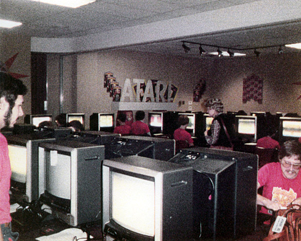


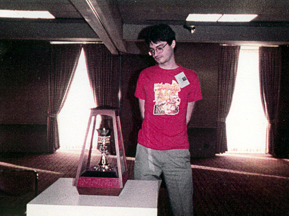
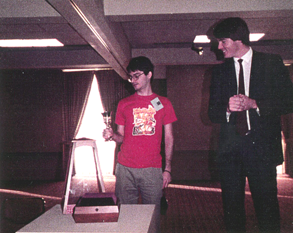

Actual Chalice photos (taken in 2005):
